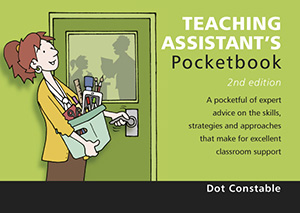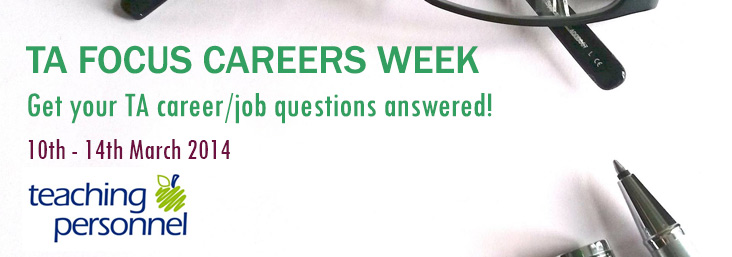
Focus on your Teaching Assistant career
Make 2014 the year of change! Have you decided it’s time to act and get yourself a better job? Perhaps you’re wondering whether to go for that course in case it improves your prospects? Well, look no further! Between 10th – 14th March, Teaching Personnel (one of the UK’s largest teaching recruitment agencies), has lent us a team of experts to answer ANY questions you may have about your job prospects. This is a perfect opportunity to utilise some of the best experts in the field.
Teaching Personnel will answer your queries and we’ll post them below. To post a question, simply add your question(s) below in the comments section or email career@tafocus.co.uk. You don’t have to give your real name if you prefer to remain anonymous.
Teaching Personnel’s team of experts will endeavour to answer as many questions as they can.
About Teaching Personnel
Teaching Personnel (www.teachingpersonnel.com) is the UK’s leading education recruitment specialist.
 Since 1996 they have registered over 100,000 teachers and classroom support staff who have chosen Teaching Personnel to help them find them work in UK classrooms. They are recognised for having the most stringent vetting procedures and for tailoring their service to meet the unique staffing requirements of every school. Every academic year they provide staff to over 4,000 schools and are recognised by schools as the quality provider of education supply staff.
Since 1996 they have registered over 100,000 teachers and classroom support staff who have chosen Teaching Personnel to help them find them work in UK classrooms. They are recognised for having the most stringent vetting procedures and for tailoring their service to meet the unique staffing requirements of every school. Every academic year they provide staff to over 4,000 schools and are recognised by schools as the quality provider of education supply staff.
Questions & Answers
Q. Can I ask whether there are many jobs in the Southampton or Bournemouth area? Every time I look for jobs there, I can’t find any and I have lots of qualifications!
A. Teaching Personnel are currently advertising 243 jobs for Teaching Assistants across Hampshire and Dorset. The majority of these will be within the proximity of Southampton and Bournemouth as these cities are where the majority or our client schools are located. If you would like to discuss job opportunities in this area, feel free to give us a call on 023 8033 1441.
Q. I am doing a level 2 online course and wanted to know whether I need to get some experience (work placement) as well. I should have checked, but the course is not one that enables you to get experience.
A. Experience is always a bonus but not having any doesn’t mean you won’t find a position after completing your course. If you are interested in getting some experience, perhaps on a voluntary basis for a week or two, we could help you find a suitable school. We would not charge the school for this and there would be no cost to you either. Once you then have this experience and have completed your course, we would be more than happy to find you a job.
(NB: More about courses)
Q. I’ve started a course in supporting teaching and learning in schools. Is that the standard qualification or is there something else I need?
A. I’m afraid we don’t have much experience of that particular course. It would be worth asking your course leader to confirm whether this is equivalent to an accredited teaching assistant qualification.
(NB: List of popular TA courses)
Q. There has been much talk about the role of teaching assistants, resulting in the loss of many TA jobs. Have you seen many schools replace redundant staff?
A. At Teaching Personnel the placement of teaching assistants has seen no decline in recent years – quite the opposite in fact. Clearly there have been a few headlines in the media but the reality is that teaching assistants are highly valued by headteachers. There may be/have been changes to the way teaching assistants are deployed in schools now and in the future but in terms of workforce reduction, that is not our experience.
Q. Is there any need for higher qualifications (foundation degrees)?
A. It really depends on your career path within education. Do you want to enter the classroom as a teaching assistant capable of leading a team of learning support staff? Is your ultimate goal to become a qualified teacher? We find work for teaching assistants who have level 1 qualifications right through to those who have degrees, previous classroom experience and HLTA status.
Q. Can I get a TA job without qualifications and learn/study on the job?
A. It depends on the school. Some schools will recruit you without a formal qualification and allow you to gain a qualification ‘on the job’, some will require you to have a formal teaching assistant qualification before appointing you. If you have the transferrable skills, some experience and the right attitude you stand a good chance of a school taking you on as an assistant with a view to helping you develop your career in the classroom.
Q. TA salaries are pretty low. Do you have many candidates on your books willing to work for such low wages?
A. The pay rates are generally determined by the role. If you are a classroom assistant helping with displays and general teacher support tasks you won’t be paid as highly as a learning support assistant who is delivering pupil interventions to help raise attainment or a specialist TA who is working one-to-one with a child that has severe special needs. At Teaching Personnel we place teaching assistants across the full range of classroom support roles.
Q. I work as an LSA in a secondary school, but want to know whether I should be looking to gain experience or qualifications to improve my future prospects?
A. You are in the best place to get more experience if a career in the classroom is what you desire. We would recommend speaking to the headteacher or a member of the senior leadership team to discuss your career progression. They are highly likely to show a keen interest in your career development as it will positively impact on their school and its pupils.
Q. Do schools prefer temporary staff rather than permanent?
A. Both we hope. It depends on the nature of the staffing requirement. Not all requirements are permanent – many are to cover a member of staff who will be returning the school in the future – perhaps after taking maternity leave for example.
Q. There appear to be many jobs advertised on the TP website. Is staff turnover high or are these ‘new’ roles?
A. Teaching Personnel is the largest agency in the UK which, generally speaking is why we have a large number of job opportunities advertised. Put into context though, there are over 26,000 schools in England and Wales with around one million staff working in them. Teaching Personnel has just over 12,500 job opportunities advertised on our website. Our jobs are a mix of temporary short and long-term cover (1 day to 1 year in length), some permanent roles and specialist assignments to support the delivery of flexible pupil interventions.
Q. Do NNEB diplomas count these days? Can I use this to become a teaching assistant, even though it was many years ago?
A. Yes we believe NNEB diplomas do count. You would need to double check this but we think the diploma counts as a Level 3 equivalent and a certificate counts as a Level 2 equivalent. The important point to make here is that an NNEB qualification/TA comparison is equivalent of and doesn’t automatically give you a TA qualification. An employer is likely to look at the qualification as equivalent to. With regards to being qualified many years ago, the likelihood is that your future employer will make the decision on whether they are comfortable employing someone that has been out of the sector for an extended period or not. Your qualification wont expire as such.
Q. I had a juvenile conviction when I was a kid, but I now want to become a teaching assistant. Will it hinder my chances with the relevant checks?
A. It really depends on the nature of the conviction. If it is a minor offence with absolutely no relation to issues around pupil safeguarding and child protection, it is unlikely to impact your ability to find work in schools – but the decision to appoint you will be down to each individual head teacher and your conviction will need to be disclosed.
Q. I’m volunteering at the moment, but can’t seem to find paid work. Do you have any advice?
A. Get a reference from the school you are volunteering at and then register with Teaching Personnel! www.teachingpersonnel.com
Q. Are there any standard interview questions I should be aware of?
A. If you can’t find relevant resources on the TA focus website, try Googling “interview questions for teaching assistants”. You’ll find plenty of resources and guidance. Perhaps Teaching Personnel will work with the TA Focus website to create this resource in the near future!
Q. There seems to be a standard application form for most schools. Can you offer any advice on how best to approach the application form, particularly where you need to detail why you best fit the role?
A. Firstly, ensure you understand the role being advertised and what it entails. Try to be as individual as possible and ensure you are articulating how you believe you will add value to the school, its staff and pupils. Don’t overthink this – they want to know about you – they don’t want you to tell them what you think they want to hear. Obviously ensure your spelling and grammar are correct!
Q. What is the process of temp work i.e. will I be paid weekly, will I be given little notice of jobs etc?
A. Yes you will be paid weekly if you join an agency. When it comes to TA work, most assignments are not on an emergency basis so you should get reasonable notice.
Teaching Personnel Disclaimer: The information on the TA Focus Careers Week Q&A page is for general information purposes only and is based on Teaching Personnel’s experiences in the education recruitment sector. Teaching Personnel make no representations or warranties of any kind, express or implied, about the completeness, accuracy, reliability, suitability for a particular purpose. By making any use of the information provided by Teaching Personnel you agree that in no event will Teaching Personnel be liable for any loss or damage including without limitation, indirect or consequential loss or damage, or any loss or damage whatsoever arising from, arising out of, or in connection with, the use of this information. Any reliance you place on such information is therefore strictly at your own risk.
** Many thanks to Teaching Personnel for answering your questions **
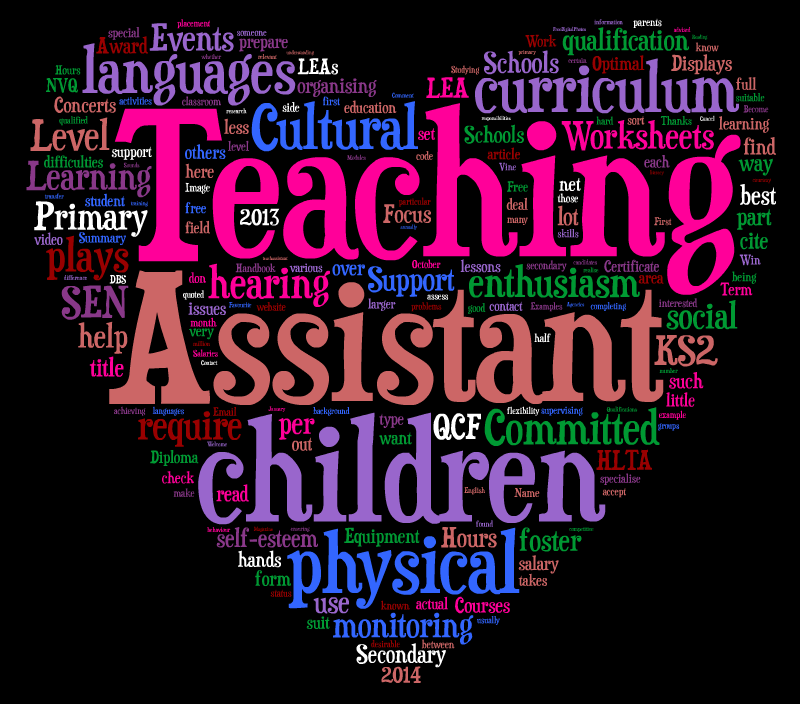
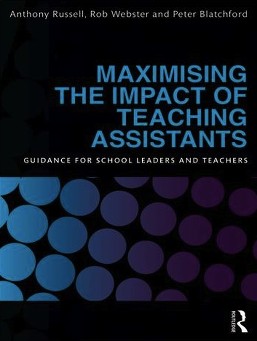

 Since 1996 they have registered over 100,000 teachers and classroom support staff who have chosen Teaching Personnel to help them find them work in UK classrooms. They are recognised for having the most stringent vetting procedures and for tailoring their service to meet the unique staffing requirements of every school. Every academic year they provide staff to over 4,000 schools and are recognised by schools as the quality provider of education supply staff.
Since 1996 they have registered over 100,000 teachers and classroom support staff who have chosen Teaching Personnel to help them find them work in UK classrooms. They are recognised for having the most stringent vetting procedures and for tailoring their service to meet the unique staffing requirements of every school. Every academic year they provide staff to over 4,000 schools and are recognised by schools as the quality provider of education supply staff.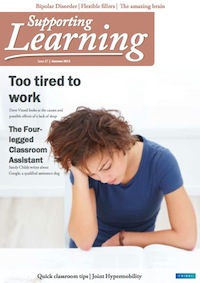
 Teachers’ Pocketbooks, launched in 2003, are intended to aid classroom teachers and support staff with practical information, ideas and expertise on a number of topics.
Teachers’ Pocketbooks, launched in 2003, are intended to aid classroom teachers and support staff with practical information, ideas and expertise on a number of topics.